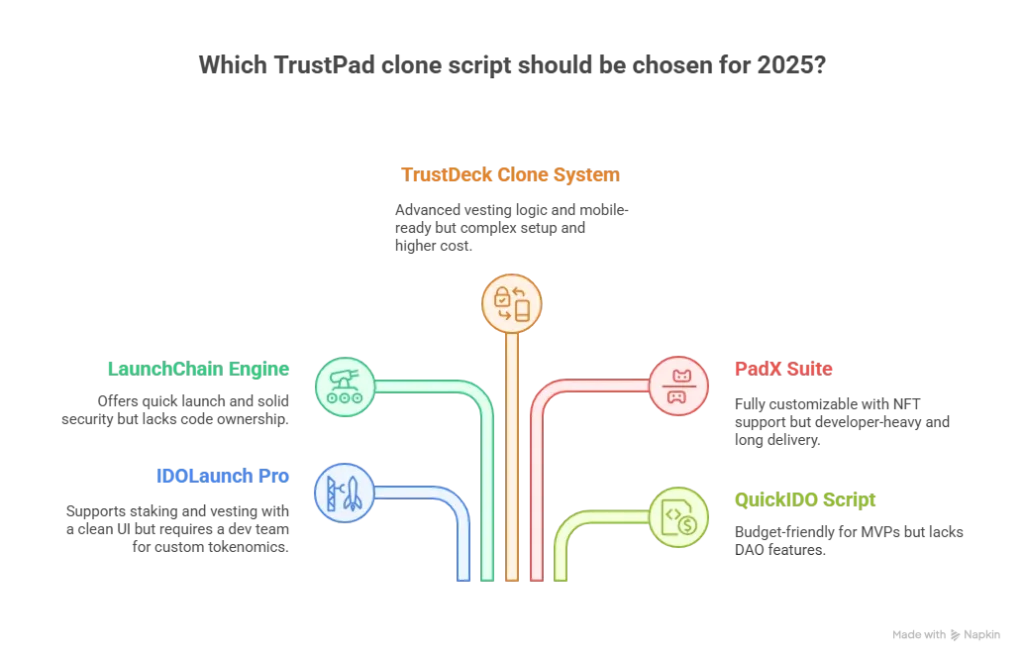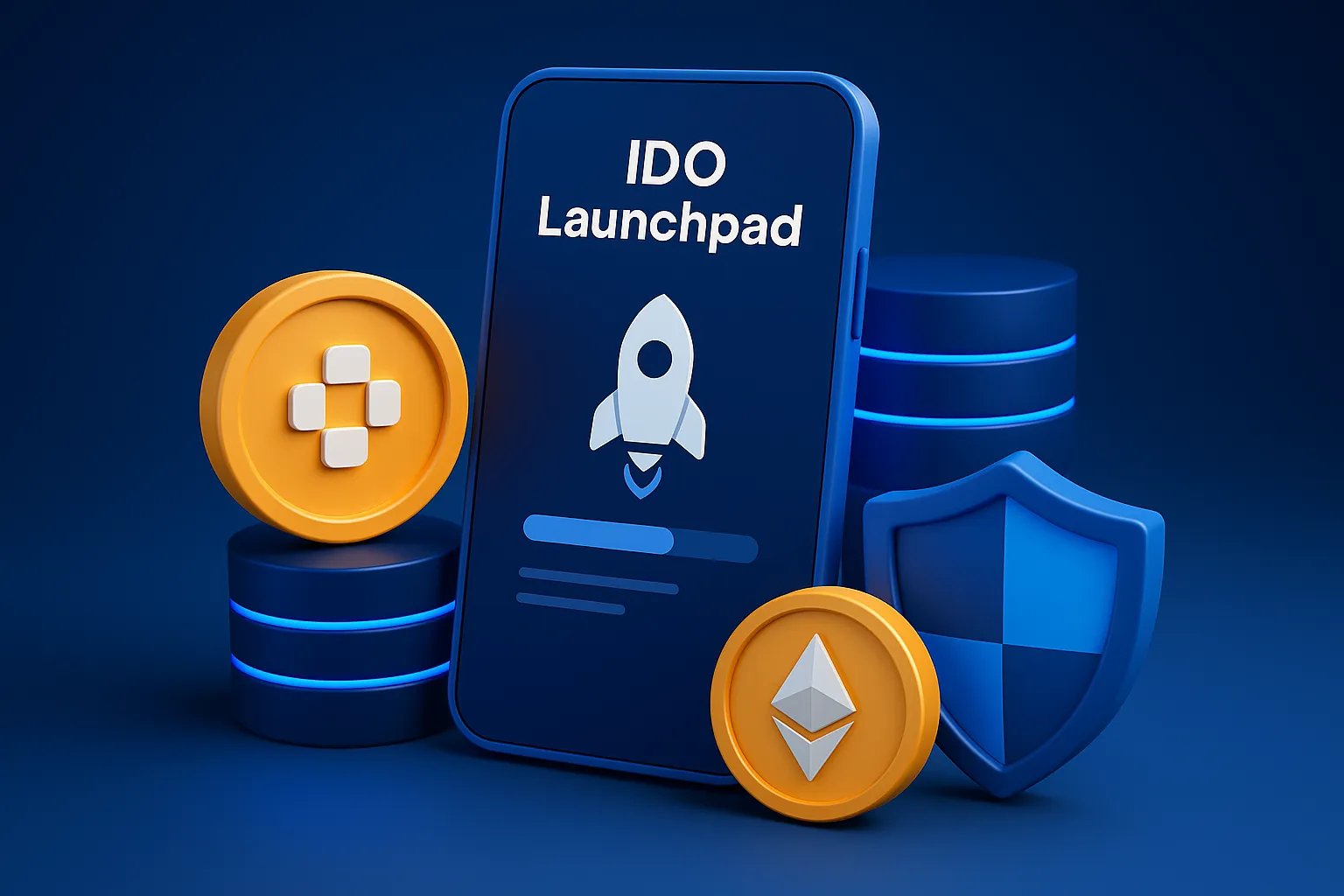If you’ve been anywhere near crypto Twitter or Web3 forums, you’ve probably heard it a thousand times: “We’re launching soon—IDO coming up!” And behind every Initial DEX Offering is a launchpad. TrustPad carved its name into this scene by offering a decentralized, permissionless, and tiered IDO experience that helped projects go from code to capital without middlemen. Now in 2025, with startup funding getting more decentralized than ever, TrustPad clone scripts are exploding in demand.
Whether you’re building a regional DeFi ecosystem, helping game projects raise funds, or launching your own launchpad-as-a-service platform, a solid TrustPad clone script gives you a head start. This blog compares the most reliable options based on features, pricing, and scalability—so you can pick the one that best fits your vision.
Why TrustPad Clones Are Booming in 2025
Centralized launchpads served their purpose, but they also came with limitations—listing fees, opaque selection processes, and no real community governance. TrustPad changed that by allowing token holders to participate in fair IDOs based on tiered staking and whitelisting systems. It’s transparent, community-powered, and gives early-stage projects a shot at real exposure.
Now imagine launching your own version of that. In 2025, TrustPad clones are enabling regional crypto hubs, niche DeFi accelerators, and Web3 venture groups to create permissionless fundraising platforms with local flair and token utility baked in. That’s why this year, clones aren’t just replicas—they’re custom-built launch ecosystems.
Read More : Developing a Decentralized IDO Launchpad : A Complete Breakdown
Core Features to Expect in a TrustPad Clone Script
If you want to run a competitive, credible IDO launchpad, your script needs more than a flashy dashboard. These are the essential components:
1. Project Onboarding Portal
- Admin interface to review, approve, and configure IDO projects
- Token info, vesting rules, funding cap, and timeline setup
- KYC/AML integration for projects
2. Tiered Staking & Whitelisting
- Token staking levels determining IDO access
- Snapshot mechanics for fair distribution
- Whitelist lottery, guaranteed allocation, or FCFS models
3. IDO Participation Interface
- Token contribution module for users
- Real-time allocation tracking
- Transaction history and status updates
4. Token Vesting & Claim System
- Smart contracts managing token unlock over time
- Dashboard for users to track and claim tokens
- Cliff, linear, or custom vesting logic
5. Governance & DAO Mechanics
- Proposal creation and community voting
- On-chain or off-chain governance integrations
- Admin controls for emergency pauses or edits
6. Multi-Chain Support
- BSC, Ethereum, Polygon, Arbitrum, or custom EVM chains
- Bridge integrations or multi-chain UI
Read More : Business Model for Decentralized IDO Launchpad: Make Crypto Projects Profitable
Pricing Comparison: Top TrustPad Clone Scripts in 2025

Let’s break down the pricing and benefits of the most popular TrustPad clones currently available:
1. IDOLaunch Pro
- Pros: Supports staking + vesting, DAO-ready, clean UI
- Cons: Needs dev team for custom tokenomics
2. LaunchChain Engine
- Pros: Quick launch, built-in wallet connect, solid security
- Cons: No code ownership, limited to default chains
3. TrustDeck Clone System
- Pros: Advanced vesting logic, mobile-ready frontend
- Cons: Complex initial setup, higher monthly cost
4. PadX Suite
- Pros: Fully customizable, supports NFT launches, strong analytics
- Cons: Developer-heavy setup and long delivery time
5. QuickIDO Script
- Pros: Budget-friendly, solid for MVPs and testnets
- Cons: Lacks DAO features, no advanced whitelisting
Cost Factors & Pricing Breakdown
TrustPad-Style Crypto Launchpad Platform — Market Price
| Development Level | Inclusions | Estimated Market Price (USD) |
|---|---|---|
| 1. Launchpad MVP System | Wallet integration (MetaMask/WalletConnect), staking tiers, basic KYC module, admin dashboard, token sale interface | $60,000 |
| 2. Full Multi-Chain IDO Launch Platform | Multi-pool fundraising, vesting engine, token distribution automation, project listing management, analytics dashboard, referral system | $135,000 |
| 3. Enterprise-Grade DeFi Launchpad Ecosystem | Multi-chain deployment, liquidity lock system, cross-chain bridge, AI risk scoring, advanced compliance layer, institutional investor modules | $250,000+ |
Miracuves Pricing for a TrustPad-Like Platform
Miracuves Price: Starts at $15,999
Miracuves delivers a secure and scalable blockchain launchpad ecosystem engineered for token sales, multi-tier staking, automated vesting, and high-performance infrastructure — built for global fundraising operations.
Note
This includes full non-encrypted source code, complete deployment support, backend & smart-contract setup, admin panel configuration, and publishing assistance — ensuring a production-ready IDO launchpad ready to scale.
Launch Your TrustPad-Style IDO Platform Faster While Others Spend $135,000+ and Wait Months — Contact Us Today
Delivery Timeline for a TrustPad-Like Platform with Miracuves
30–90 Days, depending on:
- Tokenomics & staking complexity
- KYC/AML workflow setup
- Blockchain interoperability requirements
- Vesting model depth & liquidity-lock features
Tech Stack
We will be using JavaScript for the full platform architecture (Node/Next.js, PostgreSQL) & Flutter for mobile apps, optimized for security, scalability & multi-role operations.
Blockchain smart contracts built using Solidity / Rust with Web3 integrations. Custom chain upgrades available if required.
Match Scripts with Your Launchpad Goals
Depending on your vision and audience, different clones serve different purposes:
- For DeFi startup accelerators: PadX or TrustDeck offer professional-grade options
- For regional launchpads with community tokens: IDOLaunch Pro is easy to scale
- For bootstrapped or experimental launches: QuickIDO works well for MVPs
- For service providers building launchpads for others: LaunchChain Engine offers fast resale
Beyond IDOs: Evolving Use Cases for TrustPad Clones
In 2025, TrustPad clones are evolving past the standard “buy tokens and wait” model. Some of the most creative implementations include:
- NFT launchpads for digital artists and metaverse creators
- GameFi launch platforms where players stake to unlock tokens
- DAO-powered accelerators where communities pick which projects go live
- Regional Web3 hubs launching stablecoin-backed community tokens
- Membership-based token offerings for social or creator collectives
These emerging models prove that launchpads are no longer just fundraising tools—they’re ecosystems in the making.
Monetization Models Supported by TrustPad Clones
Running a launchpad isn’t just good for the ecosystem—it can be profitable too. Here’s how projects are generating revenue:
- Platform fees on raised amounts (1–5%)
- Token sales of the platform’s own governance token
- Paid project onboarding and listing services
- Tier upgrade fees for users seeking higher allocations
- Treasury growth via staking rewards and DAO profits
Final Thoughts
TrustPad showed us how decentralized fundraising should work—transparent, fair, and community-driven. But in 2025, that model is being reimagined through localized, multi-chain, and utility-first platforms powered by TrustPad clone scripts. Whether you’re helping local Web3 builders raise funds, building a new GameFi ecosystem, or offering launchpad-as-a-service, these clone tools give you the foundation to scale quickly and securely. At Miracuves, we help innovators bring their DeFi ideas to life with fully-featured, scalable launchpad platforms. Got a vision for the next big launch? Let’s build together.
FAQs About TrustPad Clone Scripts
What is a TrustPad clone script?
It’s a ready-to-deploy software platform that replicates TrustPad’s core functionalities—token staking, IDO participation, and vesting—while allowing full customization and branding.
Can I launch an IDO platform on multiple blockchains?
Yes. Many modern clone scripts support EVM-based chains like Ethereum, BSC, Polygon, and Arbitrum. Some offer bridge support or future expansion modules.
Do these platforms support token vesting and claiming?
Absolutely. Vesting features are core to every quality TrustPad clone. They ensure secure token unlocks with dashboard views for user claims.
How do users qualify for IDO participation?
Users typically stake your platform’s token to qualify. The more they stake or hold, the better their tier and chance of allocation.
Is governance included in these clone scripts?
Yes. Premium scripts offer DAO modules for proposal voting, token-based governance, and even multisig admin roles for critical actions.
Can I monetize a TrustPad-style platform?
Yes. Most launchpads take a percentage of funds raised, charge listing fees, or monetize through native token appreciation and DAO treasury growth.
Related Articles








